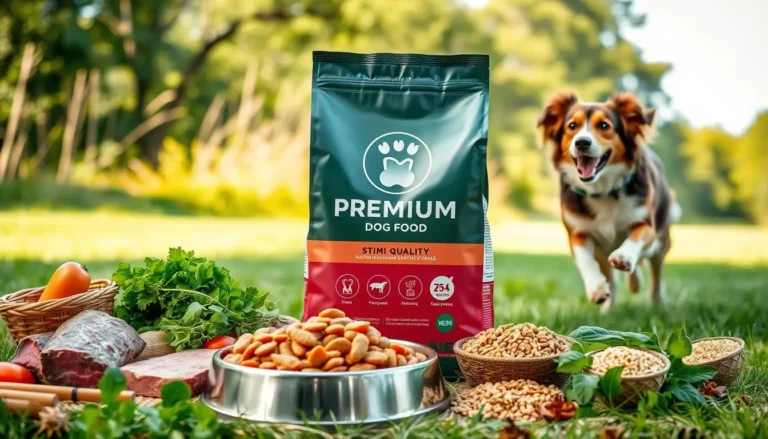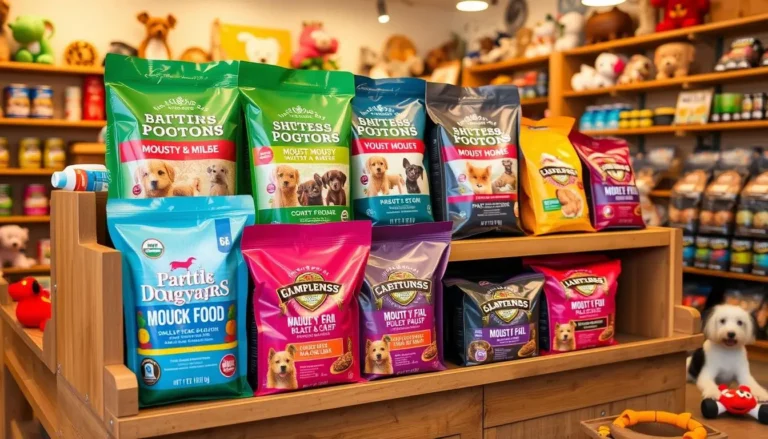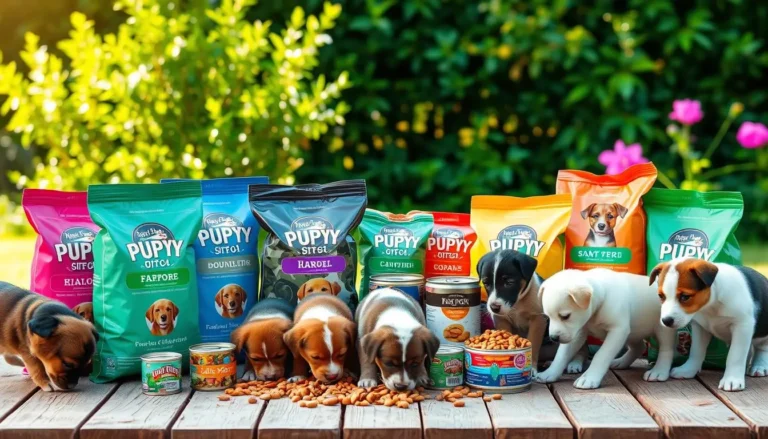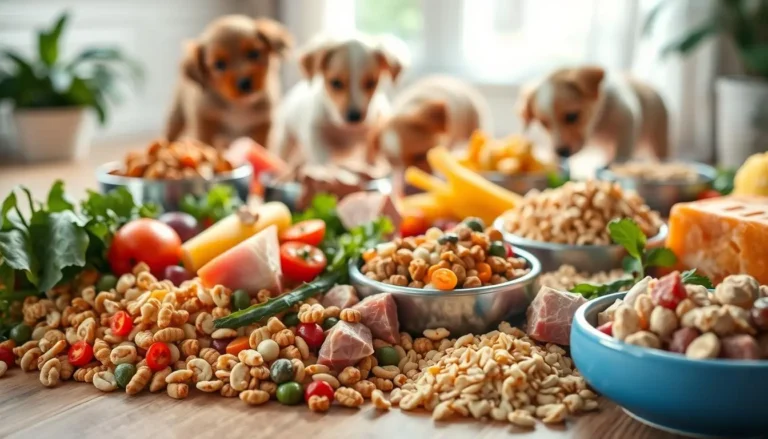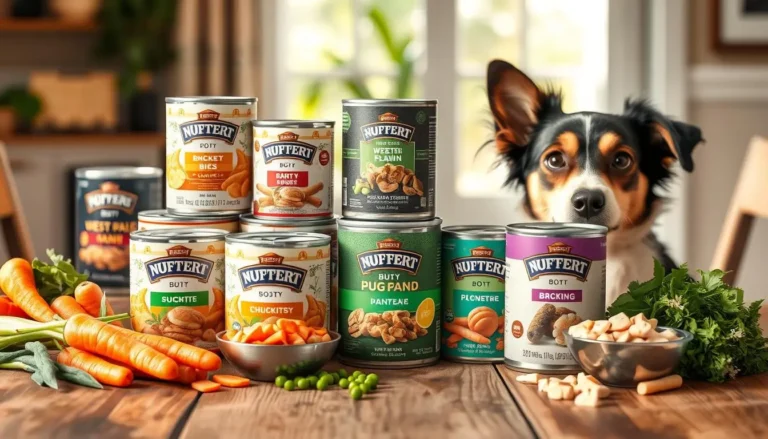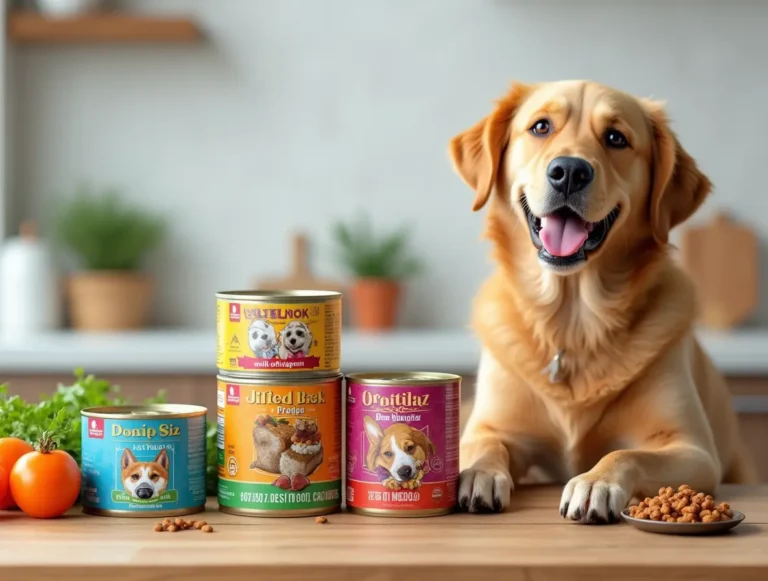Amazing Good Puppy Food for a Healthy, Happy Pup

Choosing the best puppy dog food is key for your dog’s health and growth. Puppies need special nutrients that adult dogs don’t. This makes their diet very important for their development.
Your puppy’s diet in the early years is vital for their future health. Good puppy food gives them the nutrients they need for strong bones, muscles, and a sharp mind. Knowing what makes a good puppy food diet helps your puppy start life off right.
Good nutrition affects your puppy’s health in many ways. It can make their coat shine and keep them full of energy. Spending time to find the best food for your puppy will make them happier and healthier.
Table of Contents
Key Takeaways
- Puppy nutrition differs from adult dog nutrition
- Proper diet supports comprehensive growth and development
- Quality food impacts long-term health
- Nutrient balance is crucial for puppy wellness
- Early dietary choices shape future health outcomes
Understanding Your Puppy’s Nutritional Needs
Choosing the right puppy food is key for your puppy’s health. Puppies need different nutrients than adult dogs. Their diet is very important for their well-being.

Nutrition is vital for your puppy’s early years. It supports their fast growth and sets the stage for their future health. Knowing the essential nutrients helps pick the best food for your puppy.
Essential Nutrients for Growing Puppies
Young dogs need a balanced diet for healthy growth. The most important nutrients are:
- Proteins for muscle development
- Fats for energy and brain growth
- Carbohydrates for sustained energy
- Vitamins and minerals for overall health
The Role of Proteins and Fats
Proteins are vital for your puppy’s body. High-quality protein sources build strong muscles and support the immune system. They also help with healthy skin and coat. Fats provide energy and aid in brain development.
“A well-balanced diet is the foundation of your puppy’s health and happiness.” – Veterinary Nutrition Expert
Vital Minerals and Vitamins
Minerals and vitamins are crucial for your puppy’s growth. Calcium and phosphorus play a crucial role in bone development. Vitamin D helps with calcium absorption. Other important nutrients include:
- Vitamin A for vision and immune health
- B-complex vitamins for metabolism
- Vitamin E as an antioxidant
- Zinc for immune support
When picking puppy food, look for formulas that meet your puppy’s nutritional needs.
What Makes Good Puppy Food Different from Adult Dog Food
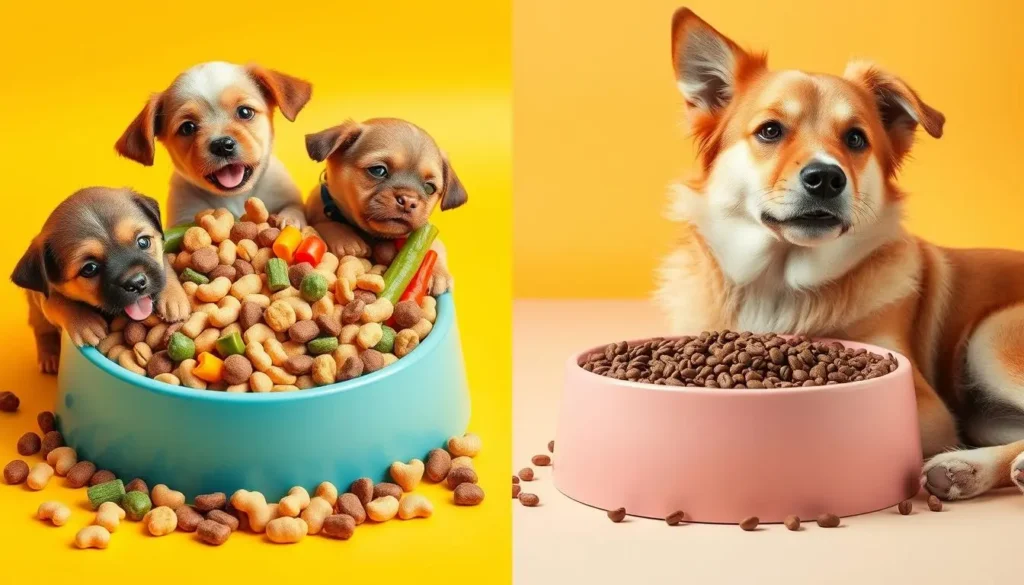
Selecting the appropriate food for your puppy is essential. It’s not just about a smaller version of adult dog food. It’s about giving your puppy the nutrients they need to grow.
Puppies need different nutrients than adult dogs. They grow fast, building muscles, bones, and brains. Good puppy food is made to help them grow strong and smart.
- Higher protein content to support muscle development
- Increased fat levels for energy and brain growth
- Specific mineral ratios for bone and joint health
- Smaller kibble size for easier chewing
Puppy food is packed with nutrients that adult dog food isn’t. Vets say puppy food should have:
- 30-40% more protein than adult dog food
- More calcium and phosphorus for bones
- Balanced omega fatty acids for brain growth
“Puppy nutrition is about fueling potential, not just filling a bowl” – Veterinary Nutrition Expert
Investing in your puppy’s food is crucial for their health. The right puppy food helps them grow into a healthy adult dog.
Choosing Between Dry and Wet Puppy Food Options
Choosing the right puppy food is key for your puppy’s health and growth. Both dry and wet foods have benefits that meet your puppy’s nutritional needs.
Puppies need special nutrients during their growth. Knowing the differences between dry kibble and wet food helps you choose the best for your puppy.
Benefits of Dry Kibble for Puppies
Dry kibble has many advantages for puppy food:
- Promotes dental health by reducing plaque buildup
- More convenient and easier to store
- Cost-effective compared to wet food options
- Provides consistent nutrient density
“Dry kibble can be an excellent foundation for your puppy’s diet, supporting overall growth and development.” – Veterinary Nutrition Experts
When to Consider Wet Food
Wet food is a good choice in certain situations:
- Puppies with dental sensitivity
- Dogs requiring extra hydration
- Picky eaters who need more appealing meals
- Puppies with specific health conditions
Pro tip: Many pet owners find a balanced approach of mixing dry and wet food provides optimal nutrition for their growing puppies.
Your puppy’s needs, breed, and health status will guide your food choice. Talking to your vet can help create the best feeding plan for your puppy.
Top Ingredients to Look for in Good Puppy Food
Choosing the right puppy food is key to your puppy’s health and growth. The best food supports their development, energy, and overall health.
Here are the essential ingredients you should seek in high-quality puppy food:
- Real Meat Protein: Look for whole meat sources like chicken, lamb, or fish as the first ingredient
- Omega-3 fatty acids for brain and eye development
- Balanced mix of wholesome grains or grain-free alternatives
- Digestible carbohydrates for sustained energy
Protein is crucial for puppy food. Young dogs need high-quality protein to build strong muscles and grow fast. Choose foods with named meat proteins like “chicken” or “salmon” instead of generic “meat meal”.
“Nutrition is the foundation of your puppy’s health and future vitality.” – Veterinary Nutrition Expert
Crucial additional ingredients include:
- DHA for cognitive development
- Probiotics for digestive health
- Antioxidant-rich fruits and vegetables
- Essential minerals for bone growth
Your puppy’s diet should be carefully crafted to provide complete nutritional support during their critical growth stages. Consulting with your veterinarian can help you make the most informed choice for your puppy’s dietary needs.
Understanding Puppy Food Labels and Certifications
Reading puppy food labels can seem like a puzzle. It’s key to know what’s in the food for your puppy’s health and nutrition.
Choosing the right puppy food is more than just a pretty package. You must understand what you’re feeding your growing pup.
AAFCO Guidelines: Your Nutritional Roadmap
The Association of American Feed Control Officials (AAFCO) sets important guidelines for pet food. These rules make sure puppy food has the right nutrients.
- Minimum protein content requirements
- Essential nutrient percentages
- Growth and development standards
Decoding Ingredient Lists
Ingredient lists tell you a lot about puppy food. Ingredients are listed by weight, so the top ones are most important.
“The first five ingredients typically represent 80% of the food’s composition.” – Veterinary Nutrition Expert
Quality Certifications to Trust
Look for trusted certifications that show food quality:
- USDA Organic Certification
- Global Animal Partnership (GAP)
- Non-GMO Project Verified
Pro tip: Certifications offer clear info on how food is made and where ingredients come from.
Common Ingredients to Avoid in Puppy Food
Choosing the right dry puppy food is key for your puppy’s health. Some dog foods have harmful ingredients that can harm your puppy. Knowing what to avoid is essential.
Here are some ingredients to avoid in puppy food:
- Artificial Preservatives: Chemicals like BHA, BHT, and ethoxyquin can cause health problems
- Artificial Colors and Flavors: These add nothing good to your puppy’s diet
- Meat By-Products: These are low-quality and may not be safe
- Corn and Wheat Fillers: They don’t give much nutritional value
Look for good dry puppy food with natural ingredients. Avoid:
“The best nutrition comes from whole, recognizable ingredients that support your puppy’s growth and development.”
Here are more ingredients to steer clear of:
- Generic “meat meal”
- Unnamed animal fat sources
- Artificial sweeteners
- Too much salt
Knowing these ingredients helps you choose the best food for your puppy. This helps them grow up strong and healthy.
Breed-Specific Considerations for Puppy Food Selection
Choosing the right puppy food isn’t simple. Each dog breed has special nutritional needs. These needs affect their growth and health. Knowing these needs helps you pick the best food for your puppy.
Puppies come in all sizes, and their food needs change with size. What’s good for a small Chihuahua might not be right for a big Great Dane. Your puppy’s size is key in finding the perfect food.
Small Breed Puppy Nutrition
Small breed puppies have special nutritional needs. They include:
- Higher metabolism rates
- More concentrated energy requirements
- Smaller kibble sizes for easier chewing
These little dogs need food packed with nutrients. It should help them grow fast. Good puppy food for small breeds has more protein and calories to keep up with their energy.
Large Breed Puppy Requirements
Large breed puppies need a balanced diet for healthy growth. Their needs include:
- Controlled calcium and phosphorus levels
- Slower growth rate support
- Joint health maintenance
| Breed Size | Key Nutritional Focus | Recommended Nutrient Ratio |
|---|---|---|
| Small Breeds | High Energy Density | Protein 28-32%, Fat 15-20% |
| Large Breeds | Controlled Growth | Protein 23-25%, Fat 12-15% |
Pro tip: Always talk to your vet to adjust your puppy’s diet for their breed.
“The right nutrition in puppyhood sets the foundation for lifelong health.” – Veterinary Nutrition Experts
Creating a Healthy Feeding Schedule for Your Puppy
Creating a good feeding schedule is key for your puppy’s health and growth. It’s not just about picking the right food. It’s about setting up a routine that’s both consistent and nutritious.
Puppies need different nutrients as they grow. Their feeding schedule should change to meet these needs. Young puppies usually need three to four small meals a day. This keeps their energy up and helps them grow right.
- Weaning to 3 months: 4 meals daily
- 3 to 6 months: 3 meals daily
- 6 to 12 months: 2 meals daily
“Consistency is key when establishing a feeding routine for your puppy” – Veterinary Nutrition Experts
When picking puppy food, think about how much to feed. Consider your puppy’s breed, weight, and how active they are. A good feeding guide can show you the right amount.
| Puppy Age | Meals per Day | Portion Size |
|---|---|---|
| 0-3 Months | 4 | 1/4 to 1/2 cup |
| 3-6 Months | 3 | 1/2 to 1 cup |
| 6-12 Months | 2 | 1 to 2 cups |
Keep an eye on your puppy’s weight and adjust their food as needed. Regular vet visits are important. They help make sure your puppy stays healthy and gets the best food.
Signs Your Puppy Is Getting Good Quality Food
Figuring out if your puppy is eating the best food means watching their health and actions. Good food is key for your puppy’s growth. It’s important to know the signs they’re getting enough nutrients.
Physical Health Indicators
Good food shows up in several ways:
- Glossy, smooth coat with minimal shedding
- Clear, bright eyes without discharge
- Pink, healthy gums and strong teeth
- Consistent weight gain aligned with breed standards
- Firm, well-formed stools
Behavioral Signs of Proper Nutrition
The right food does more than just make them look good. Look for these signs:
- Consistent energy levels throughout the day
- Alertness and quick learning responses
- Regular sleep patterns
- Enthusiasm during meal times
- Stable mood and reduced irritability
“A well-nourished puppy is a happy, thriving companion.” – Veterinary Nutrition Experts
Every puppy is different. Regular vet visits are key to making sure they’re eating well.
Transitioning Between Different Puppy Foods
Changing your puppy’s food needs careful planning and patience. Sudden changes can upset their sensitive stomachs. This might lead to health problems.
Here’s a step-by-step guide to switch to a new good dry puppy food:
- Start with 75% original food, 25% new food
- Slowly increase the new food over 7-10 days
- Keep a close eye on how your puppy reacts
Key signs to watch during food transition:
- Stool consistency
- Appetite levels
- Energy and behavior changes
“Patience is crucial when introducing new good dry puppy food to your furry friend’s diet.” – Veterinary Nutrition Experts
There are many reasons to switch foods. You might need to address food sensitivities or meet nutritional needs. Or, you might be moving from wet to dry formulas. Always talk to your vet before big changes.
Every puppy is different. Some adjust fast, while others need more time. Be ready to adjust your plan if you see any bad reactions.
When to Switch from Puppy to Adult Dog Food
It’s important to know when to switch your puppy to adult dog food. This ensures they get the right nutrition for growth. Good puppy food is key for your dog’s development. Knowing when to switch can help avoid nutritional gaps.
Age-Based Transition Guidelines
The right time to switch depends on your puppy’s breed size. Different breeds grow at different rates. This affects their nutritional needs.
- Small breeds: Typically transition around 9-12 months
- Medium breeds: Usually switch between 12-15 months
- Large breeds: Often require adult food around 18-24 months
Growth Milestones to Consider
Knowing key growth indicators helps decide when to change your puppy’s diet. Good puppy food supports these important stages.
| Milestone | Indicator | Action |
|---|---|---|
| Skeletal Growth | Reaching 80% of adult size | Consider transition |
| Energy Levels | Decreased puppy hyperactivity | Evaluate nutritional needs |
| Weight Stabilization | Slowing growth rate | Adjust food type |
Always talk to your vet for the best time to switch your puppy’s food. Individual dogs may have unique nutritional requirements that need personal advice.
“Nutrition is the foundation of your puppy’s long-term health and happiness.” – Veterinary Nutrition Expert
Conclusion
Choosing the right puppy food is more than just a shopping trip. It’s a big investment in your puppy’s health and happiness. Every food choice affects your puppy’s growth, energy, and overall health.
Understanding what your puppy needs is key. Knowing the best ingredients, looking for quality certifications, and considering breed needs are important. Good puppy food is about giving a balanced diet that supports growth at every stage.
Vets often suggest a diet plan made just for your puppy. Regular vet visits, reading labels carefully, and keeping up with nutrition news are essential. Remember, every puppy is different, so what’s perfect for one might not be for another.
As your puppy grows, keep adjusting their diet and watch their health closely. Your dedication to quality nutrition now will help your puppy become a healthy adult dog. They will remain your loyal companion for years to come.
FAQ
How often should I feed my puppy?
Puppies need to eat three to four times a day until they’re about 6 months old. After that, you can switch to two meals a day. The exact amount depends on your puppy’s breed, size, and needs. Always talk to your vet for advice.
What are the most important nutrients for a growing puppy?
Puppies need high-quality proteins for muscles, omega-3 fatty acids for brain and eye health, and calcium and phosphorus for bones. They also need a balanced mix of vitamins and minerals for overall health and immune function.
How do I know if my puppy food is of good quality?
Good puppy dog food has real meat first, meets AAFCO standards, and has natural ingredients. It should be made for puppies. Look for clear nutrition info, avoid artificial preservatives, and choose the right size for your puppy’s breed.
When should I switch from puppy food to adult dog food?
The switch usually happens between 1-2 years, based on your dog’s breed. Small breeds might switch sooner, while large breeds may need puppy food longer. Watch for growth signs and ask your vet for the best time.
Can I mix wet and dry puppy food?
Yes, mixing wet and dry puppy food is okay. It adds variety in texture and flavor. Just make sure to adjust the amounts to avoid overfeeding and meet daily calorie needs.
How do I transition to a new puppy food?
Start by mixing 25% new food with 75% old food for 7-10 days. Gradually increase the new food while decreasing the old to avoid upset stomachs.
What ingredients should I avoid in puppy food?
Stay away from artificial preservatives, by-products, corn syrup, generic meat meals, and too many fillers. Also, avoid artificial colors, flavors, and chemicals. Choose foods with whole, natural ingredients for better nutrition.
How much should I feed my puppy?
Portion sizes depend on your puppy’s age, breed, weight, and activity level. Always follow the food packaging’s guidelines and talk to your vet. Watch your puppy’s weight and adjust portions for healthy growth.

